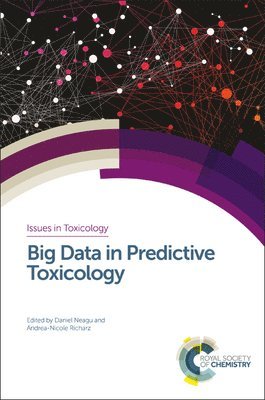
- Format
- Unsewn / adhesive bound
- Språk
- Engelska
- Utgivningsdatum
- 2019-12-10
- Förlag
- Royal Society of Chemistry
- Dimensioner
- 234 x 163 x 30 mm
- Vikt
- ISBN
- 9781782622987
- 772 g
Big Data in Predictive Toxicology
- Skickas från oss inom 7-10 vardagar.
- Fri frakt över 249 kr för privatkunder i Sverige.
Passar bra ihop
De som köpt den här boken har ofta också köpt Dinosaurs av David E Fastovsky, David B Weishampel (häftad).
Köp båda 2 för 3957 krKundrecensioner
Fler böcker av författarna
-
Computational Intelligence
Mircea Gh Negoita, Daniel Neagu, Vasile Palade
Hybrid Intelligent Systems has become an important research topic in computer science and a key application field in science and engineering. This book offers a gentle introduction to the engineering aspects of hybrid intelligent systems, also emp...
Övrig information
Daniel Neagu is Professor of Computing with the University of Bradford, where he leads the Artificial Intelligence Research Group. Daniel is Fellow of the Higher Education Academy, and also member of the Institute of Electrical and Electronics Engineers: Computer Society and Computational Intelligence Society, the Association for Computing Machinery and the British Computer Society. Daniel Neagu studies the integration of explicit and implicit knowledge with means of computational intelligence. Daniel Neagu's research on machine learning, data mining, data quality and applications to product safety, predictive toxicology and engineering analytics has been published in more than 100 peer-reviewed conferences and journals, and funded by national and international research councils, organisations and industry. Dr Andrea Richarz holds a diploma and PhD in Chemistry from the Technical University Berlin. She has managed two large international EU research projects in the area of computational toxicology and new approaches for chemical safety assessment, related to REACH chemicals and cosmetics substances, and was also involved in nanosafety project research. As Scientific Officer at the European Commission Joint Research Centre in Ispra, Italy she worked in the area of predictive toxicology, in silico methods and read-across, with special interest in integrated chemical safety assessment approaches as well as combined exposure to chemicals, including uncertainties of and confidence in the approaches in view of their regulatory acceptance. She has recently joined the European Chemicals Agency in Helsinki.
Du kanske gillar
-
Sapiens
Yuval Noah Harari
Häftad


